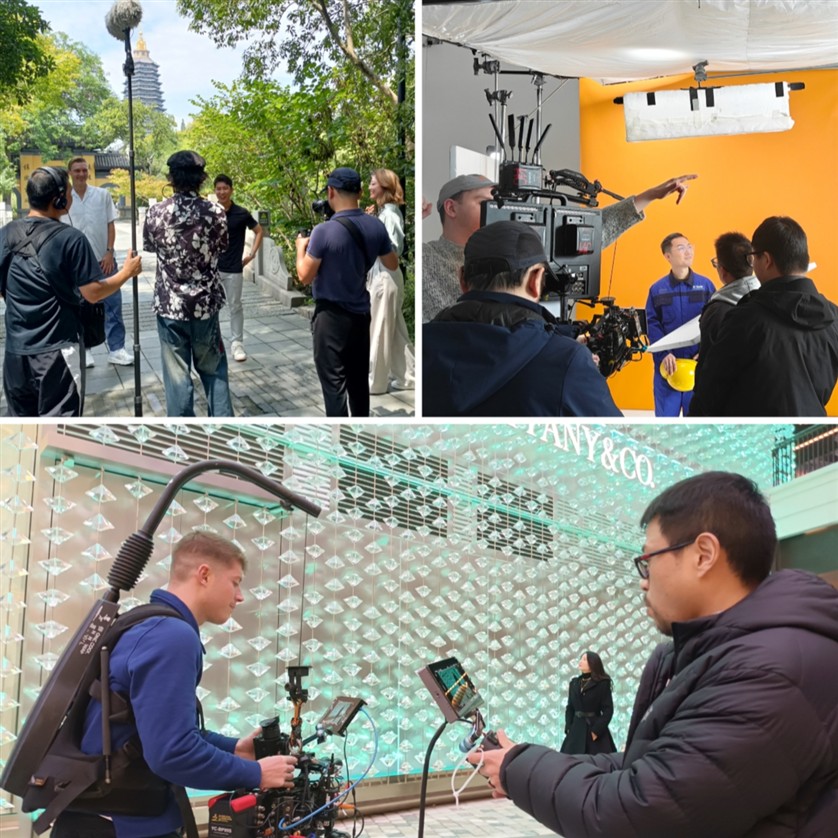Filming in Guangzhou opens up a world of opportunity with its futuristic skyline, traditional Cantonese architecture, and thriving cultural scene. Whether you’re producing a commercial, documentary, or branded film, Guangzhou offers a range of resources and cinematic backdrops to bring your story to life. This guide covers everything you need—from permits and crew hiring to equipment rental and drone regulations.

🎥 Film Production Resources in Guangzhou
Guangzhou is well-equipped for film and video production. The city boasts a strong network of:
- 🎬 Directors, producers, and cinematographers
- 📹 Videographers and camera operators, camera crews (10-hour standard days)
- 💄 Makeup and hair stylists
- 🎧 Sound engineers and boom operators
- 🔧 Gaffers, grips, prop masters, and production assistants
- 🌐 Bilingual fixers and assistant directors
Production insurance is available upon request.
📄 Visas for Filming in Guangzhou
If you’re filming in Guangzhou, we recommend applying for a business (M) visa or work (Z) visa, as you’re engaging in commercial activities. A tourist visa may work for small shoots or scouting, but is not ideal for professional production.
📦 Bringing Equipment: ATA Carnet for China
Yes, you can bring your own gear into China using an ATA Carnet, but note:
- 🛃 Chinese customs may still stop you for inspection
- 📞 Always confirm import regulations in advance
- 🧰 Consider renting locally to avoid delays
🎞 Equipment Rental in Guangzhou
Local rental houses in Guangzhou offer high-end camera gear and accessories including:
- Cameras: ARRI, RED, Sony, Canon
- Lenses: Angenieux, Zeiss, Cooke, ARRI
- Grip & Lighting: Full G&E packages available
- Drones, stabilizers, live streaming kits, and more
🖥 Post-Production in Guangzhou
Post-production support is widely available, including:
- ✅ Online/offline editing
- ✅ Sound mixing
- ✅ Color correction
- ✅ Motion graphics and animation
Tip: Always pre-visit or review sample work before committing to local post houses.
🏛 Permits & Location Access
Before filming, you’ll need to secure permission for most locations:
- Private locations: Easier to access, often pay-per-use
- Government/public spaces: Require official permits and time to process
- Public filming without permits: Technically illegal, even for small crews
- Phone/small camera vlogging: Commonly tolerated, but not guaranteed
📸 Iconic Filming Locations in Guangzhou
- Canton Tower – skyline symbol and night shots
- Chen Clan Ancestral Hall – traditional Lingnan-style architecture
- Temple of the Six Banyan Trees – historic religious site
- Huacheng Square – urban cityscape with water features
- Shamian Island – colonial-era buildings and leafy streets
☀️ Climate & Air Quality Tips
- Weather: Humid subtropical climate, very hot & wet in summer
- Rainfall: Heavy from May to August
- Air quality: Varies from moderate to poor—check AQI before outdoor filming
- Lighting: Use early morning and late afternoon for optimal natural light
🚁 Drone Rules in Guangzhou
- ❌ Flying in central city zones is prohibited
- ✅ Some zones allow drones with pilot registration
- 📏 Height and location restrictions enforced by local aviation authorities
- 📋 Always register in advance and check NFZ maps
💵 Currency & Payments
- Currency: RMB (CNY) only
- Digital payments are king – Alipay and WeChat Pay are used everywhere
- Have a local team or fixer assist if your payment apps are not set up
🏨 Accommodation & Meals
- Hotels: ~$100–$200 USD/night (international chains available)
- Meals: Budget $10–$50 USD/day depending on preferences
- Catering options for crew can be arranged upon request
🚐 Transport & Logistics
- Airport: Guangzhou Baiyun International Airport (CAN)
- Rail: Guangzhou Railway Station, Guangzhou South Station
- Transport for crew:
- 5-seat van + driver: ~$150–$200 USD/day
- 9-seat and cargo vans also available
- Ride apps: Didi and Meituan (Chinese equivalents of Uber/Lyft)
🎯 Ready to Film in Guangzhou?
At Shoot In China, we support international filmmakers with:
- 🎯 Fixer services
- 🎯 Crew hiring (bilingual teams)
- 🎯 Equipment rental
- 🎯 Permits and logistics
- 🎯 Location scouting
📧 Contact: [email protected]




